Building a Sustainable and Hope-Filled Future at St Michaels, Daceyville.
“It’s great to see students teaching adults about the world they live in… the kids have become the teachers.”
– Deanne Di Stefano, Assistant Principal
The St Michael’s Vision is to nurture curiosity, ignite imagination and empower innovation for a sustainable and hope filled future. The Student Ambassador program became a catalyst for the development of a whole school environmental plan involving students, staff and the wider school community. Student’s worked together to action the school environmental plan collaboratively and inclusively, through mini initiatives they co-designed. They chose to address the lack of greenspace around the school, alongside too much waste being produced at the school (both in playground rubbish and environmental factors creating waste such as unnecessary paper usage), creating a number of solutions which they educated the school community about and then implemented. The Ambassadors effectively worked with a number of school and community partners to secure donations, education sessions and support for their initiatives, bringing a more inclusive approach to the project and amplifying the effects of it beyond the students themselves.
Project outcomes:
- Increased greenspaces in the school, planting three edible gardens and installing an aeroponic garden tower which grew many different vegetable types.
- Inclusion of QR coded labels in the garden, linking to the newly set up Munch website, with information on each of the fruit and vegetables.
- Conducting a school bin waste audit with the help of Bayside Council, identifying that, among other waste, there was over 2,500kg of food waste a year likely going to landfill.
- Creation of an information program about their actions using school channels such as assembly and a newly established website, Going Global – St Michael’s Daceyville.
St Michaels, Catholic Primary School is a Kindergarten to Year 6 Primary School, part of the Sydney Catholic Schools network, located in Sydney, New South Wales, Australia. St Michael’s provides strong community connections to cater for the needs of all students and values deep thinking, creativity, with a strong focus on wellbeing and Catholic values. St Michael’s aims to prepare students for a hopeful and sustainable future.
St Michaels have been involved in the Meg Language and Culture program for many years. They heard about the Going Global, Student Ambassador Program and felt that this would be an excellent opportunity for their students to move beyond language acquisition and focus on broader global concepts.
Project description
The Student Ambassadors identified that they would like to address two environmental issues that were noticeable in their school. They planned to implement a number of initiatives to address these issues. However, they identified they first needed to research these issues, secure money to purchase resources and source specialists to help with the project. They also identified the need to educate the rest of the school about the project and invite their involvement. This required timetabling different types of sessions including mentoring of class representatives by the student leaders.
Two main issues were identified:
- Too much waste within our school community, rubbish in the playground and too much school environmental waste such as paper and water usage.
- Limited amount of green space in our school environment.
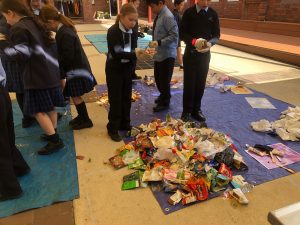
Students conducting the waste audit with the help of Bayside Council.
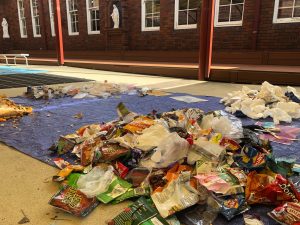
Project aims and achievement criteria:
Aim: Restore the school eco system:
- Increased number of non-invasive flora types.
- Increased number of native fauna.
Aim: Increase school awareness and participation in environmental stewardship:
- Student representatives being involved in planting, maintaining gardens, caring for native animals and reducing waste.
Aim: Reduce, reuse and recycle to minimise waste:
- A rubbish audit will indicate a decrease in the amount of waste produced.
- Students know how to reduce, reuse and recycle at school effectively.
The United Nations, Sustainable Development Goals
As part of the knowledge exploration on topics linked to Global Citizenship Education, the students learnt about the UN Sustainable Development Goals and identified the following goals linking to their project:
- 11: Sustainable cities and communities: We want to limit rubbish in our community which leads to the 11th goal, reusing this unneeded waste to something we need.
- 12: Responsible consumption and production: We will reduce, reuse and recycle to minimise the harmful results of overproduction.
- 13: Climate Action: By reducing rubbish, we minimise the carbon footprint which is part of climate action.
- 15: Life on Land: Having more green area creates a more natural environment and looking after it makes people realise that we need to pay more attention to the environment which creates a chain reaction and soon will make a huge impact.
- 17. Partnerships for the Goals: By partnering with students, parents, staff and wider community organisations and businesses, the project became more inclusive and was amplified to impact more people.
Implementation phase
Informing and educating others
The first step was to inform the school community about the project and invite both feedback on it, as well as participation in it. Through targeted audience identification, students used a variety of strategies to reach their target audiences:
- Students: School newsletters, posters around the school, presentations at assembly, students visited classrooms to present project and invite participation, surveys.
- School community (staff, parents): Posted on Compass, school newsletter announcements and invitation to the project information evening at the Parents and Friends Meeting.
- Wider school and local community: Social media and school newsletter.
Involving others
“This program has helped to build bridges between students, staff and parents in many ways. We’ve loved watching the community get involved and support the work of the students”.
Amanda Tinson – Coordinator Student Opportunities & Global Citizenship Coordinator.
Part of being a Global Citizen, is understanding and applying the ideas of GLocal (Global to Local and Local to Global) to not only understand local and global issues, but also understand how to design effective changemaking for the dynamic systems in globalised societies we live in.
Through intentional mapping of different groups using Meg’s Considering Impact model, students were able to identify how their project both could involve others, and might impact on them.
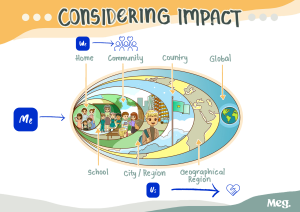
The Ambassador’s peers were invited to take an active part in the caring of their school environment, through more planting and waste reduction. Class Representatives were a key part of the structural involvement and worked as a bridge between the Ambassadors and the students in each class. They helped spread information about the project and also encouraged their peers to get involved. A leadership survey was administered at the end of the year to both Ambassadors and Class Representatives to help identify the skills developed across the year.
Staff were brought together by the common goals the Ambassadors shared and staff with specific expertise were able to share this to help achieve the goals.
Local organisations were incredibly accommodating and enthusiastic to get involved. Keeping Australia Beautiful worked with students to conduct a waste audit, Bayside Council facilitated workshops for all classes in the school, Bunnings provided many donations and ran workshops to establish worm farms and create edible gardens around the school. The local council who also made donations and provided education programs and workshops to upskill the Ambassadors to help them reach their aims.



Parents were also invited to take part and, those who did, could then apply their learnings from the project such as planting skills and waste reduction, to their own households and workplaces, creating what the students early on identified as ‘the ripple effect’. The Parents and Friends Association was enthusiastic to get on board, particularly when they discovered that St Michael’s was throwing out nearly 3 tonnes of food waste (lunch!) along with over 1 tonne of single use plastics per year. This prompted the introduction of nude food and food waste going back home in the students’ lunch box.
“When others see you making a change, they want to join in”
– Ksenia Tomkus, Year 6 student
Project outcomes
The additional sense of responsibility for our Global Ambassadors has fostered great leadership qualities leading to significant changes in how the wider school community works together”
– Sarah Lopes, Year 5 Teacher
With the students planning a real world project, they had to pivot and redesign parts of their project as they implemented it across the year, responding to the real world challenges they faced. Using a range of problem solving, critical thinking and creativity skills, the project necessarily needed to adapt from the initial plan. The project shifted from increasing green spaces to more of a focus on sustainable food practices. They ended up planting three edible garden beds and purchased an aeroponic garden tower where they grew a harvest of 30 vegetable types. They maintained the focus on reducing waste throughout the program. Students researched the different plants on offer and created a website to inform the community, called ‘Munch’, which they linked to the project website.. Students, staff and community can now scan a QR code at the plant which will take them to the information on the Munch website.
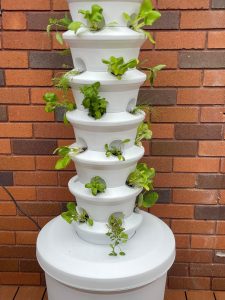
The newly installed Air garden and the growth after two weeks.
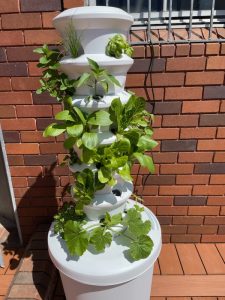
Students benefited in a number of ways; by having a better school environment and increased clean, fresh air through additional carbon dioxide produced by more planting. Students learnt skills to create sustainable and eco-friendly spaces which they can use for the rest of their lives. The Ambassadors and Class Reps developed a range of leadership skills too. A large number of students, beyond the Ambassadors, were introduced and educated about the ideas and skills of Changemaking, which (as they pointed out) may lead to future changes in Australia and a more environmentally sustainable world.
Students involved in the project needed to use a wide range of skills both both the project design and the implementation phases. They identified their own growth in the following skills:
- Public speaking and presentation skills – presenting at assembly and to each class in the school
- Collaboration skills – how to communicate, get ideas across effectively, listen to each other
- Time management
- Project planning
- Technology
Staff have also been collaborating to develop a whole school scope and sequence where sustainability outcomes are built upon in each grade from Kindergarten to Year 6. The school plans to implement the curriculum program in 2023.
The local parish, Marist Brothers and OLSH sisters also share the school site, also benefitting from the grounds improvements made.
It has been a pleasure watching the students involved in this project grow in confidence and develop their initiative. Initially, the students were quite shy and hesitant to share their ideas. They are now able to share with confidence and speak in front of large groups. They have presented to each class in the school. The program sparked an abundance of exciting ideas from the students. Our greatest challenge was to prioritise actions and develop a structured plan to harness the most important ideas. Our greatest success has been building student awareness of the environmental issues that we can easily address. This has shown students and the wider community that every person can make a little change leading to a big impact.”
– Amanda Tinson, Global Citizenship School Coordinator
Project alignment to school and state curriculum
The program closely aligned with the Science and Technology NSW Syllabus particularly in the Living World strand. Environmental stewardship is also an ongoing focus in the Religious Education curriculum.
It is well aligned with the Sydney Catholic School Global Capabilities, particularly ‘creating new value’. Sustainability has now become a shared responsibility at St Michael’s. They plan to continue to build the program so that it becomes embedded in all that they do… it will become part of who they are. The Student Ambassador Program has helped the school to focus on the importance of environmental stewardship on a local level. It has covered 5 of the 6 capabilities outlined in the Sydney Catholic Global Capabilities, all except ‘cultural capability’.
Sydney Catholic Schools Global Capabilities:
- Communication;
- Collaboration;
- Critical thinking;
- Creating new value;
- Confident learner; and
- Cultural capability.
2023 and beyond – next steps
It is planned for the project to continue to develop from this point we’ve reached and the school aims for the change action process to become embedded in our school life, both within and beyond the curriculum. The project this year has been foundational for the newly developed ongoing environmental team and long term plan and vision for the school.
Doing this work makes me feel like I have contributed to changing our world”
– Joshua Ksunadi, Year 6 student

